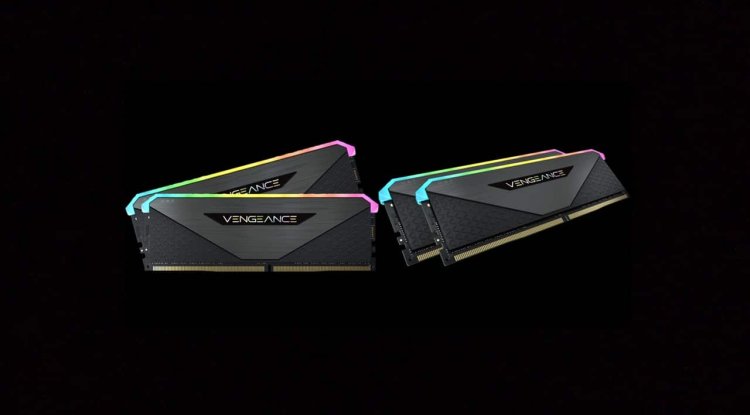Corsair Vengeance RT RGB DDR4-3600 32GB
The DDR5 is there, but the DDR4 modules are still very interesting because of their lower cost and wide distribution. We tried one.

The DDR5 is there, but the DDR4 modules are still very interesting because of their lower cost and wide distribution. We tried one of the newest sets of this memory that puts Corsair on the market.
| Kit Label | CMN32GX4M4Z3600C18 |
|---|---|
| Type | DDR4 DIMM |
| Capacity | 4 × 8 GB |
| Chip Configuration | Samsung B-Die, 1 rank |
| XMP Profiles | DDR4 3600 18-22-22-42-64 @ 1.35 V |
| Guarantee | 10 years |
Corsair introduced the Vengeance RT RGB memory a few months ago to refresh and align the appearance of its Vengeance RGB memory with the design of newer generations of its other products, primarily the case (for example, the 4000D Airflow model). The metal passive coolers covering the surface of the module are decorated with a triangular pattern presented with 4000D series enclosures, which are combined with a pattern of brushed aluminum and complete with a stylized Vengeance inscription. In the case of the RGB variant of the Vengeance RT module on memory, we also have a long illuminated bar that is pulled a little down at the corners resulting in more impressive lighting. In addition to the dark variant, Corsair also offers a bright, that is, white variant of the module.
Behind the slat, the purpose of which is diffusing, that is, the softening of light is located programmable RGB LEDs divided into 10 zones. We control LED lighting with the Corsair iCUE app, which also serves to control all other Corsair devices, as well as some third-party components such as individual Asus motherboards, for example. The possibilities of adjusting the lighting are very advanced, both in terms of available ready-made animations, both preferably arranging your own effects. In addition to adjusting leDs, it is also possible to monitor the temperature of memory modules through iCUE. In practice, these RGB modules look great thanks to the loyal COLORS of LEDs, the very high peak brightness of LEDs and the soft quality of light. A very important thing about the software configuration of modules is to synchronize the physical location of the module in the slots with the arrangement of modules in the software. This is, of course, done through software-making, and the result is the correct display of the selected lighting effects.
The new memory is available in modules with a capacity of 8 to 32 GB and in sets of two, four modules or even eight modules, with a minimum capacity of 16 and a maximum of 256 GB. In this most expensive kit, speeds of 3600 MHz CAS 18 or 3,200 MHz CAS 16 are available. It should be noted that corsair on memory packaging emphasizes that it is optimized for work on the AMD Ryzen and Ryzen Threadripper platforms, hence this gigantic 256-gigabyte putty. In the fastest variant, we have an additional two speeds – 3,600 C16 and 4,000 C18. We received a package of four 8-gigabyte modules with a speed of 3,600 MHz CAS 18 on the test, with the full XMP profile being CAS 18-22-22-42 at 1.35 V. The modules are based on Samsung's famous B-Die memory chips, which opens up the potential for additional performance optimization.
We compared the memory with G.SKILL's two 8-gigabyte modules of TridentZ RGB Royal speed DDR4-3600 C16 on the Asus board ROG CrossHair VIII Hero Wi-Fi, Ryzen 9 5900X and radeon RX 6800 XT graphics, in combination with Windows 11. In addition to the performance on the XMP profile, we also tried the performance of the automatic configuration applied by the panel – basically loading the SPD profile at the speed of the DDR4-3200.
| Time Spy CPU | TW Warhammer 2 | Borderlands 3 | Hitman 3 | Far Cry 6 | |
| Corsair Vengeance RT XMP | 13.671 | 149 fps | 178 fps | 154 fps | 105 fps |
| Corsair Vengeance RT Auto | 13.188 | 141 fps | 175 fps | 154 fps | 102 fps |
| G.SKILL TridentZ 3600 C16 XMP | 12.387 | 148 fps | 177 fps | 154 fps | 100 fps |
In most apps used–3DMark's Time Spy CPU test and four games running at 1080p resolution and maximum detail, Corsair's memory set performs higher despite having looser latency compared to G.SKILL's. The reason for this is not the difference in memory capacity. 16 GB is more than enough to perform tests like this. It's actually about the number of modules–the memory controller can access data more flexibly in a configuration with four than two modules, hence the higher performance.
The price of this memory is higher than the memory of similar specifications, but without RGB lighting. On the other hand, when we compare Vengeance RT RGB with third-party modules with RGB LEDs, it turns out that they are quite favorable. Given quality performance, good performance, and great software support, we can highly recommend them if you're looking for memory that will take your PC's look to the next level.





































